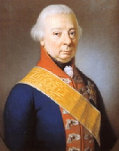



Markgraf Karl Friedrich
von Baden
Cuvée Physiokrat
Grand Duke Karl Friedrich von Baden, (1728-1811), whose 73 year Baden state rule saw a significant increase in population, was probably the most important count who adopted the new physiocratic theories of the French Francois Quesnay.The central thesis of his revolutionary economic theory shows that agriculture is the only true spring of wealth for the people as a "gift of nature". One of the demands was, with absolutely topical relation, to renounce all state interventions in the economic process. In 1771, Grand Duke Karl Friedrich traveled to Paris where he got to know the Physiocrat Mirabeau and DuPont. Inspired by the ideas set forth of these mentors, he returned to Baden the next year to write the notable work titled, "Abrégé des Principes de l’économie politique", about the advantages of the physiocratic system.
It was Karl Friedrich who then also tried to profess the theory of the Physiocrats on a worldwide level, with the assistance of his respected chamber and police advise Johann August Schlettwein. Starting in 1771 and lasting until 1801, the town of Dietlingen, was selected for the "Single Tax" (impôt unique) experiment, which focused on achieving success in wine growing, implemented by the practical improvements of the new agricultural system. The naming of the vineyard Physiokrat, and the wine, Cuvee Physiokrat, is owed to the brilliant ideas of Physiocracy that were developed by these enlightened economic scholars.
page 1 ⇒

